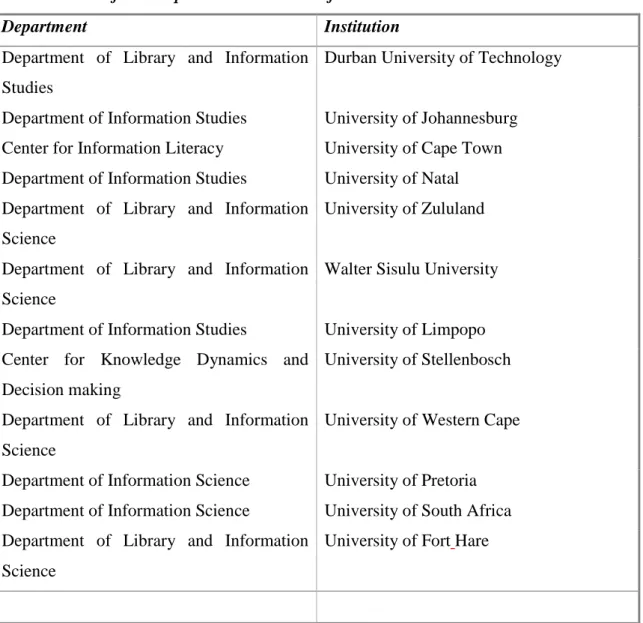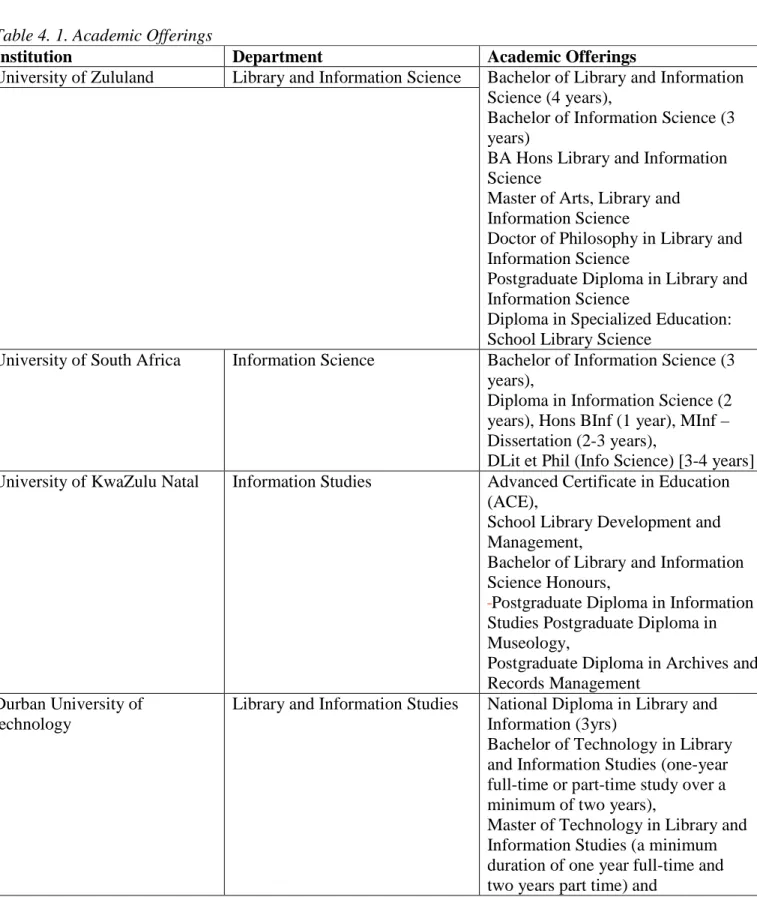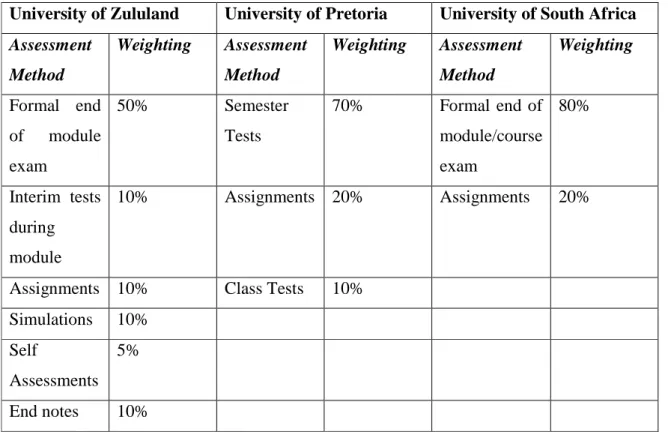This study examined the nature and level of information ethics education in library and information science departments in South Africa. Study guidelines for content analyzes were received from three LIS departments that offered information ethics as a complete stand-alone module.
Conceptual Setting
Ethical Dilemmas Facing Information Professionals
He believes that information ethics should be part of LIS education and training, as this will enable information professionals to safely and ethically engage in information-related activities. The study of LIS curricula has been approached from many different perspectives; for example, Ocholla (2000 and 2005) and Synman (2000) focused on.
Contextual Setting
In the 1980s, many departments were renamed the Department of Library and Information Science/Studies. For example, Ocholla and Bothma (2007:2) state that LIS programs at the University of Cape Town are offered by the Center for Information Literacy in the Center for Higher Education Development.
Problem Statement
Not much research has been done on information ethics education in library and information sciences in South Africa. While Ocholla's study is helpful in demystifying information ethics education in Africa, there were some areas that the study did not cover.
Aim of the Study
For example, the study does not actually describe what is happening on the ground; rather, it presents the views of LIS experts on the continent on information ethics education in LIS. This study aimed to gain a more complete understanding of information ethics education in LIS, and thus included LIS Department Heads, lecturers teaching information ethics, and information ethics module study guides.
Objectives
The study did not use content analysis to determine what is taught in information ethics modules and did not include lecturers who teach information ethics.
Research Questions
Who, in terms of academic departments and areas of knowledge and expertise, teach information ethics modules.
Significance of the Study
Scope and Limitations
Structure of Dissertation
The chapter also gives the significance of the study as well as the scope and limitations of the study. The purpose of this chapter is to present and provide analysis of data collected from respondents, in this case Heads of LIS Departments, lecturers teaching information ethics modules/courses and information ethics study guides.
Definition of Terms
Introduction
What are Ethics?
Purpose of Ethics
The societal rules that have been developed are such that if most individuals follow them, at least most of the time, they will flourish. These rules may impose limitations on freedom, but were established to promote a greater good.
Factors Affecting Ethics
- Organizational Factor
- Individual Factor
- Personal Values and Personality
- Family Influence
This means that children should be raised at a young age to respect or adhere to ethical standards. When contextualized on the basis of the research problem, it can be said that LIS education should aim to sensitize students at an early stage to respect ethical norms related to information.
Ethical Theories
- Consequence Based Theory
- Duty Based Theories
- Rights Based Theories
- Virtue Based Theory
According to Fallis (2007:8), a more recent and more user-friendly duty-based theory was developed by W. According to Fallis (2007:5), some theorists believe that the goodness of an act is based on the rights that people have.
Ethics in LIS
Froehlich (1997) focused on the obligations of library and information professionals to themselves, to their organizations, and to the “broader environment in which information professionals work:. a) social responsibility; (b) obligations between professionals and clients and third parties; (c) obligations between professionals and systems; (d) professional obligations; (e) obligations to community or cultural standards'. It follows from these values that information professionals should work within accepted ethical frameworks.
Information Ethics
He believes that the ethics of information technology (computer ethics) is only a small part of information ethics.
Ethical Issues in Information Production
Ethical Issues of Information Collection
Ethical Aspects of Information Access
The issue of referral/brokerage services can be studied in relation to institutionalized services as well as end-users. There is also the issue of misinformation (or misuse of information) which can cause great (economic) harm to users.
Issues of Information Ethics
- Privacy
- Access
- Accuracy
- Intellectual Property
In South Africa, the right of access to information is protected by the Constitution of the Republic of South Africa (Act 108 of 1996). These guidelines, as explained by Fallis, provide people with a list of website features that are supposed to be indicators of accuracy (e.g. author identity, whether the author is an authority on the subject, no advertising in the document, no spelling or grammatical errors , the website is updated, authoritative references are cited, etc.).
Teaching and Learning of Information Ethics in Library and Information Science
- The Need for Education
- Why Teach Information Ethics?
- The Content
- Who should Teach Information Ethics
- What Methods should be used to Teach Information Ethics?
- To Whom should Information Ethics be Taught?
- Proposed Model for Teaching Information Ethics
The Information Ethics Special Interest Group (of the Association for Library and Information Science Education) is strong. Carbo (2005:28) believes that information ethics is far too complex to envision what should be taught.
Related Studies
To investigate the curriculum presence of information ethics modules in Library and Information Science in South Africa. Are there information ethics modules offered in the South African Department of Library and Information Science.
Introduction
Ngulube asserts that describing the methods used in a particular study is important because it enables other researchers to replicate the study and ascertain the validity and reliability of the findings. The broad purpose of this chapter is to explain how the study was planned and carried out.
Research Methodology
Failure to provide information to the researcher about the context of the situation in which the phenomenon under study occurs;. On the advantages of qualitative research, Matveev (2002 6) argues that qualitative research achieves a more realistic sense of the world that cannot be experienced in the numerical data and statistical analysis used in quantitative research.
Research Method
- Content Analysis
- Survey
In this study, the documents for content analysis were mainly the study guides of the information ethics modules. The content analysis was based on an examination of the content of information ethics courses in library and information science departments in South Africa.
Population
Durban University of Technology Department of Information Studies University of Johannesburg Center for Information Literature University of Cape Town Department of Information Studies University of Natal Department of Library and Information. Department of Information Sciences University of Pretoria Department of Information Sciences University of South Africa Department of Library and Information.

Data Collection Instruments
- Questionnaire
The authors state that open-ended questions allow respondents to answer as they wish and do not limit them to a single alternative. Closed-ended questions allowed the researcher to present alternatives from which the respondents could choose based on what was closest to their own views or beliefs (Breakwell, Harmond, and Fife-Schaw, 1995: 178).
Data Collection Procedure
The purpose of the questionnaires was to obtain their views on information ethics education in their respective departments or schools. Regarding information ethics study materials, the LIS HODs were asked to email them if they had electronic versions.
Data Analysis
During these two weeks, the researcher sent e-mails to remind the respondents of the questionnaires and to confirm that they had received them.
Challenges
Introduction
Heads of Library and Information Science Departments (Section 4.3), teachers who teach information ethics (Section 4.4), and study guides and course outlines (Section 4.5), which were analyzed to determine what is taught in the information ethics modules.
General Information
Bachelor of Technology in Library and Information Studies (one year full-time or part-time study over a minimum of two years). Master of Technology in Library and Information Studies (a minimum duration of one year full-time and two years part-time) and.

Responses from Heads of LIS Departments/Representatives
- Necessity of Information Ethics Education in Library and Information Science
- Who Should Learn Information Ethics
- Presence of Information Ethics in the LIS Curriculum
- Academic Department(s) responsible for Teaching Information Ethics Modules
- Academic Rank of the Instructor
- Field of Expertise and Knowledge of an Information Ethics Module Instructor
- What Bearing does the Lecturer’s Area/Field of Study have on the Teaching of The Module?
To determine methods of teaching information ethics modules in LIS departments or schools in South Africa. Appendix One: Questionnaire on Information Ethics Education in South African Library and Information Science Departments or Schools.
Responses from Lecturers Teaching Information Ethics
- Personal Information
- Information Ethics Module
- Modules’ Aims
- Learning Outcomes of the Module
- Units Covered in the Information Modules
- Duration of Information Ethics Modules and Lectures
- Academic Level(S) at which an Information Ethics Module is offered
- Teaching Methods used to Teach the Information Ethics Module
- Assessment Methods
- Challenges of Teaching Information Ethics
- How the Challenges can be Overcome
Content Analysis Results
- Introduction
- Background Information
- Module Providers
- Modules’ Content
To determine the challenges in teaching and learning information ethics in LIS departments or schools in South Africa. I am conducting a study on "Information Ethics Education in Library and Information Science Departments in South Africa".
Summary
Introduction
The purpose of this chapter is therefore to discuss and interpret the findings made from data collected on information ethics education in Library and Information Science departments or schools in South Africa. As mentioned earlier, the study aimed at heads of LIS departments on the curriculum presence of information ethics; lecturers who teach information ethics modules for the modules' details (content, objectives, learning outcomes and so on); and information ethics modules' study guides to confirm the data provided by the lecturers.
Background of Library and Information Science Departments
Necessity of Information Ethics Education in Lis
In principle, library and information professionals must be aware of their duties and responsibilities to society and perform them in an ethical manner. A study by Chu (2006) of LIS curricula from American Library Association accredited LIS departments found that information ethics was among the top core and most visible modules.
Who Should Learn Information Ethics?
Considering Carbo's point of view, which accommodates the roles of non-information professionals as users of information, it is clear that information ethics education should also be a part of other professions. The tailored approach is based on the premise that information ethics education can take a different path in other disciplines.
Presence of Information Ethics in LIS Curricula
Considering the current situation with information ethics education in the country, this seems likely. As the results of this research have shown, information ethics is offered as a full module or spread over the content of other modules.
Departments Teaching Information Ethics
Content of Information Ethics Modules
Although it is advocated by many, such as Fallis (2007) and the Information Ethics Special Interest Group (2007), that ethical theories should be part of information ethics, only the LIS department at the University of South Africa, based on the findings, contained a unit of ethical theories in their information ethics module. It is also suggested by Laudon and Laudon, and O'Brien in Lee and Chen (2005:2) that an information ethics module should cover the following broad areas: the relationship between ethics, social and political issues in the information society; and the moral dimensions of the information age, to name a few.
Academic Levels at Which Information Ethics Modules are Offered
Perhaps, there would be no better module to learn these codes than a module that focuses on information ethics. To avoid duplication of content, it would be better if students in their first year are introduced to information ethics in an information ethics module before following a continuous approach as suggested by Carbo.
Methods used to Teach Information Ethics
The argument is that if students are perceived to be good enough at second-year level to appreciate and understand information ethics, then they would be even better at higher levels. Information ethics aims to shape students' behavior so that they can be better users of information, and this should continue at all other levels as students' experiences grow.
Challenges of Teaching Information Ethics
It is necessary to continue to explore alternatives and evaluate the effectiveness of different models to promote student learning and exploration. Incorporating models, diverse readings, active discussion and interaction among students and perspectives from external speakers; provides opportunities for effective learning and improves education.
Summary
The findings indicate a lack of uniformity and perhaps collaboration between LIS departments in information ethics education in South Africa. Other issues that arose were the lack of African literature, which was seen as a challenge, and also the limited duration of classes at the University of Zululand.
Introduction
Summary
- To Investigate the Curriculum Presence of Information Ethics Modules in Library And Information Science Departments in South Africa
- To Find out who Teaches Information Ethics Modules in Terms of Academic Departments
- To Determine the Level(s) at which Information Ethics Modules are offered in LIS Departments or Schools in South Africa 88
- To Determine the teaching Methods of Information Ethics Modules in LIS Departments or Schools in South Africa
- To Determine the Challenges in the Teaching and Learning of Information Ethics in LIS Departments or Schools in South Africa
For example, an information ethics module in the LIS Department at the University of Zululand was offered for a single term. To determine methods of teaching information ethics modules in LIS departments or schools in South African schools in South Africa.
Conclusion
Recommendations
- Presence of Information Ethics Modules in the Curricula
- African Literature and Ethics
- Teaching Methods
- Departments Teaching Information Ethics Modules
- Academic Levels at which Information Ethics Modules are offered
- Information Ethics Modules’ Content
- Recommendations For Further Research
The professional code of information professionals should be made part of the content of information ethics modules. To determine the level(s) at which information ethics modules are offered in LIS departments or schools in South Africa.
